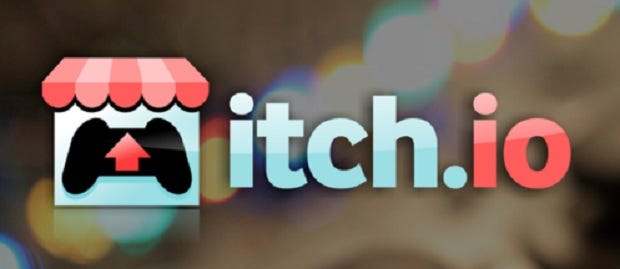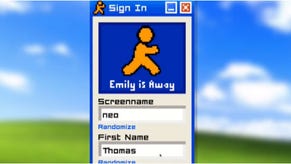The New Curiosity Shop: Itch.io Interview
Retail therapy
I visit some strange places during my daily trawls across the vastness of the internet. The search for obscure and eclectic games demands a willingness to look beyond the convenience store of Steam and the archive of Good Old Games, and in recent months I've found myself visiting itch.io on a regular basis. I didn't intend to visit on such a regular basis but interesting games increasingly linked to the site as a download portal. In a reversal of the common high street trend, itch.io is a rapidly expanding independent store, with plenty of freebies alongside the paid goods.
Designed as an open platform, it aims to give developers control over the sale or distribution of their games. I contacted creator Leaf Corcoran to learn more.
RPS: For any of our readers who may not be aware of itch.io, could you explain the basic principles behind the store and the motivation that led you to create it?
Corcoran: Sure, itch.io is an indie game marketplace and distribution platform. It gives you the ability to design a custom page where people can download, play or purchase your games. There are no barriers to get started, if you want to start selling a game then you can do so immediately. Free games and web games are also supported. All purchases are Pay-what-you-want (with an optional minimum). Someone buying your game always has the option to pay above the minimum if they really like what you’ve got uploaded.
The original idea for the site wasn’t a store at all, it was just a way to quickly create a customized game homepage. I had a handful of Ludum Dare games I had created and I wanted a quick way to make nice pages for them. I wasn’t too thrilled about some of the existing game hosts because the pages they provide for your game are filled with distracting content that has nothing to do with your game. Things like ads, other people’s games, promotion for their own site, etc.
After I had a basic game page creation system running I soon realized that I could add buy buttons. I researched PayPal’s API and soon had a prototype up and running shortly afterwards. If you want more background information I wrote this blog post when I first launched the site.
RPS: You have an open submissions policy and allow developers to set their own prices. What are the advantages of a system without any curation?
Corcoran: The biggest advantage is the anyone can use service regardless of how big, small, unknown or well known they are. I’ve heard so many disappointing stories of developers struggling to get their game noticed and voted on just so they could get a chance to sell their game on Steam.
A lot of people were skeptical when the site originally launched, and a lot still are. As I see the library of games grow I’m not disappointed with the quality of the games at all, I’m proud of the eclectic collection of games available.
RPS: Does the open nature of the store create its own problems with visibility for titles? Or do you see the store as a place to facilitate for the logistics of sales rather than a more traditional storefront?
Corcoran: Originally I was satisfied with just providing the tools to sell games. I didn’t even have a way to browse games the first few months, it was up to the developer to share their game’s URL. As time went on I realized I was sitting on top of a lot of pretty cool games, and anything I could do to help promote them would be a great move.
Since then I’ve added various ways to explore the games, either through filtering by platform/genre/price or discovering collections of games on someone’s profile. Even with all this though, visibility is still a challenging problem. I’ll probably be experimenting with various solutions for quite some time, but I have a feeling that user recommendations are going to be a primary form of discovery in the near future.
RPS: Speaking of logistics – what is the workload involved in running itch.io? As far as I’m aware, developers are responsible for a lot of the groundwork such as page design when submitting, but I’m guessing everything isn’t quite as simple as it looks from your end.
Corcoran: Luckily the site has been set up in such a way to avoid as much unnecessary work as possible. The infrastructure of the site is simple to maintain with minimal components. All of the payment providers are configured for instant payout directly to the sellers. When a sale takes place itch.io doesn’t need to hold the money temporarily and handle paying later. This limits what’s possible (eg. it would be hard to offer bundles between multiple developers) but the effort saved is invaluable.
Because time spent maintaining is minimal, more time can be spent on new features. Regular updates is something users of itch.io have come to appreciate as the site has evolved over the past year. The biggest challenge in the future will be keeping the site running smooth as it grows. Making sure the site is always accessible, renders fast, and is continuously backed up becomes more complicated as the number of users grows.
RPS: Valve recently announced that they would be setting up a ‘reports’ procedure. Is there any content that you’d be unhappy to sell and do you have any similar procedures in place?
Corcoran: The acceptable use policy on itch.io is currently pretty vague concerning the content hosted. So far nothing has been removed from the site because of it’s nature. My aim is to make a site that’s accepting and safe for everyone though, so there will be an updated acceptable use policy explicitly mentioning content that serves to be hateful.
Additionally, just like Steam, the ability to report games has recently been added to itch.io. I think the best approach here is to make it easy for users to communicate their thoughts about the content hosted and then act accordingly.
RPS: From my perspective, the ability to go on sale instantly and set a chosen price (including zero) are the biggest advantages of itch.io as compared to more traditional digital storefronts. Are there any other features that have been put in place to help developers?
Corcoran: Everything about the site is streamlined for the developers to get stuff done with little fuss, it’s all self service. In addition to running a sale and variable pricing like you mentioned, they can generate download keys for promotions, share editing access with their game, enter into itch.io’s press system, and link Steam or Desura keys.
Whenever a new feature is planned for sellers it’s planned from the ground up to be completely controllable by the account doing the selling.
RPS: The fee charged by itch.io is 10% of a sale but fees are currently disabled. Could you say why that is and where does the money for server costs and other expenses come from?
Corcoran: When the fee was originally removed, itch.io cost approximately 30 dollars a month to host. I figured it would be a good gesture to let developers keep a little extra from their sales. Since then the monthly cost has grown more than 10x and I’ve still been financing the site out of my own pocket.
I’ll probably be re-instantiating the fee in the coming weeks, but with a twist. The fee will be developer controlled. They’ll have a slider to set a fee that they think is fair for what itch.io provides, with a minimum of 0 as an option. I’ve spoken to a handful of developers about this and they were all very excited.
RPS: Since launching have you encountered any unexpected problems and if so how have you dealt with them?
Corcoran: Things will break. I can do my best to anticipate problems and create well tested code but inevitably something is going to break. The site could go down, payment providers could drop payments, upload could stop working, etc. It can be incredibly stressful at times but I’ve realized that it’s best to just stay calm and think through the issue at hand. If anything every breaks momentarily the community is always very forgiving, which is a great sign.
When I started hosting game jams I ended up getting a lot more submissions than I expected. In case of the Candy Jam, the entire store got flooded with quickly produced games related to candy. It made it really difficult to see anything else. I got some complaints and so I ended up moving jam games to their own separate island, no longer visible from the main site. It was a drastic change but I didn’t have much choice. Now I have a separate process to promote jam games back into the main listing.
RPS: What plans for the future?
Corcoran: Game jams have become a big part of itch.io the past few months. Support for hosting jams was not part of the original plan, I just decided to implement a prototype one day when helping host a jam for a small community of friends. I noticed there wasn’t a turnkey solution for hosting jams already around so I started offering the service to more people as I saw jams popping up. itch.io has hosted the recent Candy Jam and Flappy Jam with great success. Well over a thousand games have been submitted between the two.
There are a handful more jams that have either happened or are lined up as well. Soon itch.io’s game jam functionality will be opened up to the public and I’m really excited to see where it goes.
As for the store, game discovery is the next big task I’m looking to tackle. I have a handful of ideas to leverage the support of the community into creating really great game recommendations and exploration along with a handful of resources for helping developers get more exposure to their games.
RPS: Thanks for your time.






